Lauren Blodgett is a Brooklyn-based immigration attorney and founder of the non-profit The Brave House, which provides legal & holistic services, mentorship, and community to young immigrant women in New York. Lauren was on the Forbes 30 Under 30 list for Law and Policy due to her innovative approach to legal services. Lauren graduated from Harvard Law School where she focused on international human rights and worked in non-profits in Morocco, Thailand, Jordan, Tanzania and Cambodia. She was a Fulbright Scholar in Austria, where she researched international law and taught English. When not in the courtroom, Lauren is a part of different dance communities in NYC, such as Daybreaker (an early morning, sober dance party) and 5 Rhythms ecstatic dance.
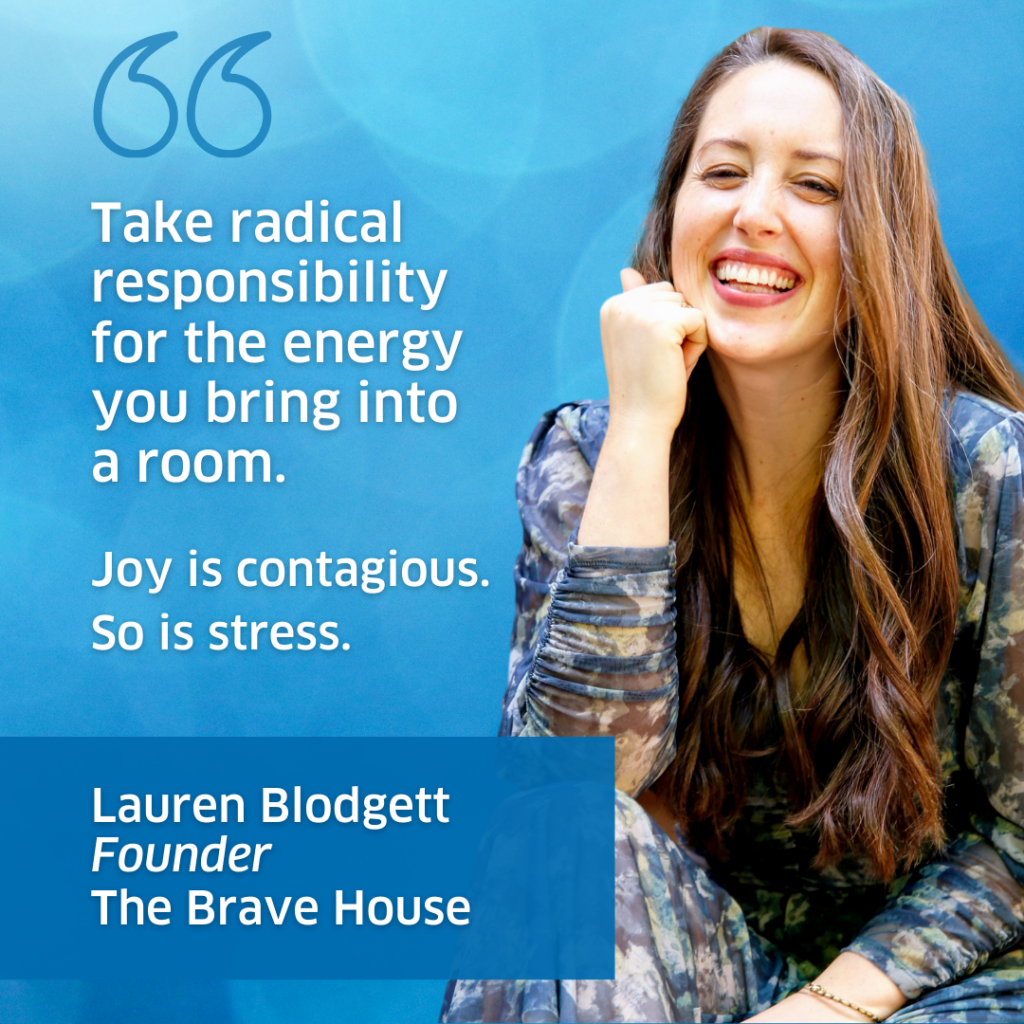
What does “entrepreneurship” mean to you?
Lauren Blodgett: Listening, curiosity, and empathy, combined with the desire and bravery to build a more beautiful world. It is dreaming of ways that things could be better and asking why not? Why not this approach? Why not now? And why not by us?
How did your company come to be?
LB: I started the Brave House because I wanted to change the way that legal aid is provided, especially to young people. My goal as a lawyer is to make the legal process as inclusive, holistic and loving as possible. So at it’s core, the Brave House seeks to view each client as a whole person who carries with her an entire bag of complexities, trauma, and challenges (as we all do). Our approach acknowledges that everything is interrelated and that strength in one area often strengthens another.
My a-ha moment came when I was working at a NYC-non-profit legal assistance to young women fleeing gender-based violence and co-leading a girls group of my clients. In my unique role as attorney and the organizer of this group, I saw patterns and gaps in critical services. Essentially every time I met with a client, she would ask me questions about all the non-legal challenges she was facing: how do I get an English tutor? How do I apply for college? How can I get health insurance? Where can I make friends? and the list went on and on.
The problem isn’t that social services do not exist in New York, but there are obstacles preventing this specific population from accessing them, like language barriers, cultural stigma, or lack of information. I started to see how the intersection of all of these challenges compounded – the more resources a client was lacking, the harder it was to get ahead in any area, including her legal case.
The Brave House emerged as the solution that I wished already existed for my clients: a sisterhood and one stop shop for young immigrant women. I had already worked in this type of legal model when I was in South Africa before law school, so I had the inspiration to draw from. I spent months interning at a center in Cape Town that provided wrap-around services to refugees. I saw attorneys working with social workers and teachers and wellness practitioners all under one roof. This was the type of place I wanted to build for my clients.
How has your business changed in response to the COVID-19 pandemic?
LB: Many Brave House members are living in shelters or situations where their health, safety, and well-being are not supported. In addition to the challenges caused by quarantining in these conditions, our members were excluded from many national and local relief efforts due to their immigration status, such as when the federal government sent stimulus checks to many U.S. citizens. In response, the Brave House adapted to provide our members with hot meals, groceries, emergency funding, connection to local health care services, and a supportive community. We also sent care packages (“Brave Baskets”), which are social-emotional toolkits including items like toilet paper, snacks, soap, socks, and tools for easing anxiety such as journals and coloring books. We also had lots of one-minute dance parties over Zoom.
What is your proudest and darkest moment so far?
LB: Oof. I’m a very positive person but there have been dark days for sure. At one of my very first meetings where I pitched the idea for the Brave House, the lawyer across the table from me laughed in my face. I’ll never forget it. She almost seemed offended that I even dare dream so big, and she expressed to me that the idea was too big, too hard, too impossible. That was rough. And my cases have been really challenging as well – from having to discuss details of their past trauma in order to pursue their legal case, to facing hardship in real-time like ICE raids to PTSD, it can get dark pretty fast. Luckily, the bright moments are also abundant and very easy to come by. Anytime a member wins, we all win. From winning an asylum case, to passing their calculus test, to creating art together like the mural we painted on the Lower East Side last summer, I pretty much always have a reason to smile and beam with pride.
How is your company changing the landscape?
LB: We are taking an innovative approach to legal aid by prioritizing compassion, community, and wellness for this particular population. I believe joy is a human right and as a lawyer it is my duty to go beyond fighting for humanitarian protection and also advocate for a life that is full of happiness and opportunity. It’s not enough to survive, I want my clients to have the tools to thrive as well. We hope our services will cause ripple effect that expands way beyond each individual member. That is why we do things like English lessons, college panels, financial literacy workshops in addition to really fun events like rock-climbing, ice-skating, astrology and art.
Another way we are innovative is that we’ve created an App for our members with the goal of placing resources, community, and agency directly into their hands.
What do you wish you knew when you started? Is there anything you would do differently?
LB: This is tricky question for me because I believe that our mistakes and challenges are the pathway to growth, so I don’t think I would change any of it. I knew very, very little when I started. I learned by spending my weekends on “Google University” in my PJs on my couch just finding ways to make it happen, and asking other people lots and lots of questions. I think my ignorance allowed me to dream very big and shoot incredibly high. I am constantly saying “I don’t know” and that has taught me humility and patience and how to have grace with myself. Especially as a woman I think it’s important to do things before you’re ready and not be paralyzed by perfectionism. When you are an example doing hard things and messing up and growing, you give other people that permission as well.
What advice/credo do you live by as you grow the business / what is your professional and personal mission statement?
LB: My personal mission is to spread love, have fun, and be of service. In life and in business, I try to always ask myself “how can I sprinkle some magic on top of this moment, interaction, e-mail, etc”?
Where do you find inspiration when faced with challenges?
LB: For such a happy, bubbly person, I actually find a ton of inspiration in death. One of my non-negotiables in life is to have fun every day because I’m very aware of how brief this life is. I’m inspired by stoic philosophy because it’s a great reminder to not to take things so seriously. It reminds me to take chances, to hug my friends, to laugh loudly because we aren’t going to get out of here alive. And don’t you want to live before you die? I try to really appreciate life and live in uninterrupted delight, wonder, and adventure… because I know how brief and magnificent life is.
What does “success” look like for you? What do you think will help you achieve it?
LB: To me, success is being able to embrace life’s dualities and know that two opposite truths can exist at the same time. Something can both extremely scary and super fun. Life can be devastatingly painful and breathtakingly beautiful. I can be a bulldog in the court room and a butterfly on the dance floor. When offered an either/or, success is choosing both.
Has personal or professional “success” changed for you since the COVID-19 pandemic?
LB: Yes. Ideas of success and accomplishment have softened dramatically for me since the pandemic started. Before it was more tied to statistics and verdicts and data and goals. Now it looks a lot more like squishy hugs and feet in the grass and seeing my loved ones. It’s “How much did I love today?” instead of “did I win today?”
What’s it like to work alone or with your partners? What advice do you have for fellow entrepreneurs about building and leading teams?
LB: Listen, listen, listen and adopt the identity of a life-long learner. I believe that building an impactful organization means accepting the fact that you don’t know most things and seeing every moment as a learning opportunity. It is a gift that I get to learn from my team – their experiences, their skills, their ideas. I’ve become very comfortable with building the plane while flying it because I trust that as a team we will figure it out as we go.
Self-awareness is your own responsibility. Be aware of your strengths, your privilege, your patterns, your triggers – all of it. My journey to self-awareness has been a long one (and is always a work in progress!), but I owe it to my team and my community to do that inner work. I find that it makes an organization stronger and honestly it just makes you more of a delight to be around.
Lastly – take radical responsibility for the energy you bring into a room. Joy is contagious. So is stress.
Many entrepreneurs continue to perfect their daily routines to support their work and greater vision; would you mind sharing your morning routine or a regular ritual that grounds your work each day? How has it changed in recent months?
LB: Mornings are my jam. I actually like going to bed because I love my mornings so much. They look the same every day. I open my eyes and say “thank you, thank you, thank you.” I climb down from my loft bed and turn off my sun-simulator alarm-clock. I refuse to use my phone as an alarm because I don’t want to have any incoming stimulus until after I’ve had my morning routine. Then I climb back up to the loft and meditate, followed by journaling. I write 5 things I’m grateful for from the past 24 hours, and the more detailed/small the better (that pretty patch of flowers I saw on my walk, that hilarious convo with my roommate, etc). Then I write 10 dreams I want to have achieved in 10 years – this is the same list every day, because there is power in repetition. These dreams range from “I am fluent in Spanish” to “I gave a Ted talk” to “I have fun every day.” Then I read for at least 5 minutes (yes, I set a timer). Then I reward myself with a cup of coffee and some movement before I touch my phone. The movement could be a walk outside, dancing to Lizzo in my apartment, or going to Daybreaker (an early morning dance party at locations all over NYC).
What keeps you motivated during this time?
LB: A clear vision for a more beautiful and inclusive world and the absolute faith that we will get there.
What kind of an entrepreneur do you want to be known as, as in, what do you want your legacy to be?
LB: Someone who made others feel welcome, special and loved.
What is a quote or some words of wisdom that help get you through the tough days?
LB: Go first. Be the first to jump in the pool, to get on the dance floor, to raise your hand to present in class. Just DO THE THING. If you’re hesitating it’s probably because you’re afraid, and the thing you’re afraid of probably isn’t as bad as you think it’s going to be – the water’s not that cold. You can wait around for the timing to be perfect or to feel ready, or you can just go for it. I’d rather live my life getting bruised up on the court than sitting safely on the sidelines.
Have you experienced mentorship in your career? Do you feel it was easily available to you?
LB: Absolutely. Most of what I’ve been able to do in my career is due to my mentors and my eagerness to learn from others. Mentorship has come easy to me because I showed up relentlessly at every opportunity available and always asked how I could be of service first before asking for any help myself. I did a lot of notetaking at board meetings and executive team brainstorming because I just asked if I could come and be helpful. No task was too small or beneath me – grabbing coffees with a degree? Yup. Transcribing notes? Yes. Now that I’m leading an organization, all of that exposure early on in my career has been indispensable.
I also think mentorship came easily to me because I believe everyone we meet is a teacher. As long as you ask yourself, “what can I learn from this person?”, mentorship will be everywhere you look.
Who are the people who have mentored or influenced you in your life or career? How has their influence changed the trajectory of your entrepreneurial journey?
LB: Lenni Benson. Desiree Hernandez. Sabi Ardalan. Paola Atlason. Radha Agrawahl. And countless other amazing women. They are role models for selflessness, creativity, humility, and patience. They believed in me and are exemplars of the kind of human, leader, & thinker I want to be.
I am also really influenced by children – my nieces in particular. As adults, we make things so complicated and serious. Seeing a problem through the eyes of a child allows you to see the simplicity in it. Also they help bring out my Mary Poppins alter ego – “In every job that must be done, there is an element of fun, you find the fun and *snap* the job’s a game!” You can apply the spoonful of sugar approach to almost anything.
Do you have someone you’d like to nominate to be profiled in our Faces of Entrepreneurship series? Please let us know by emailing media@thecenter.nasdaq.org.
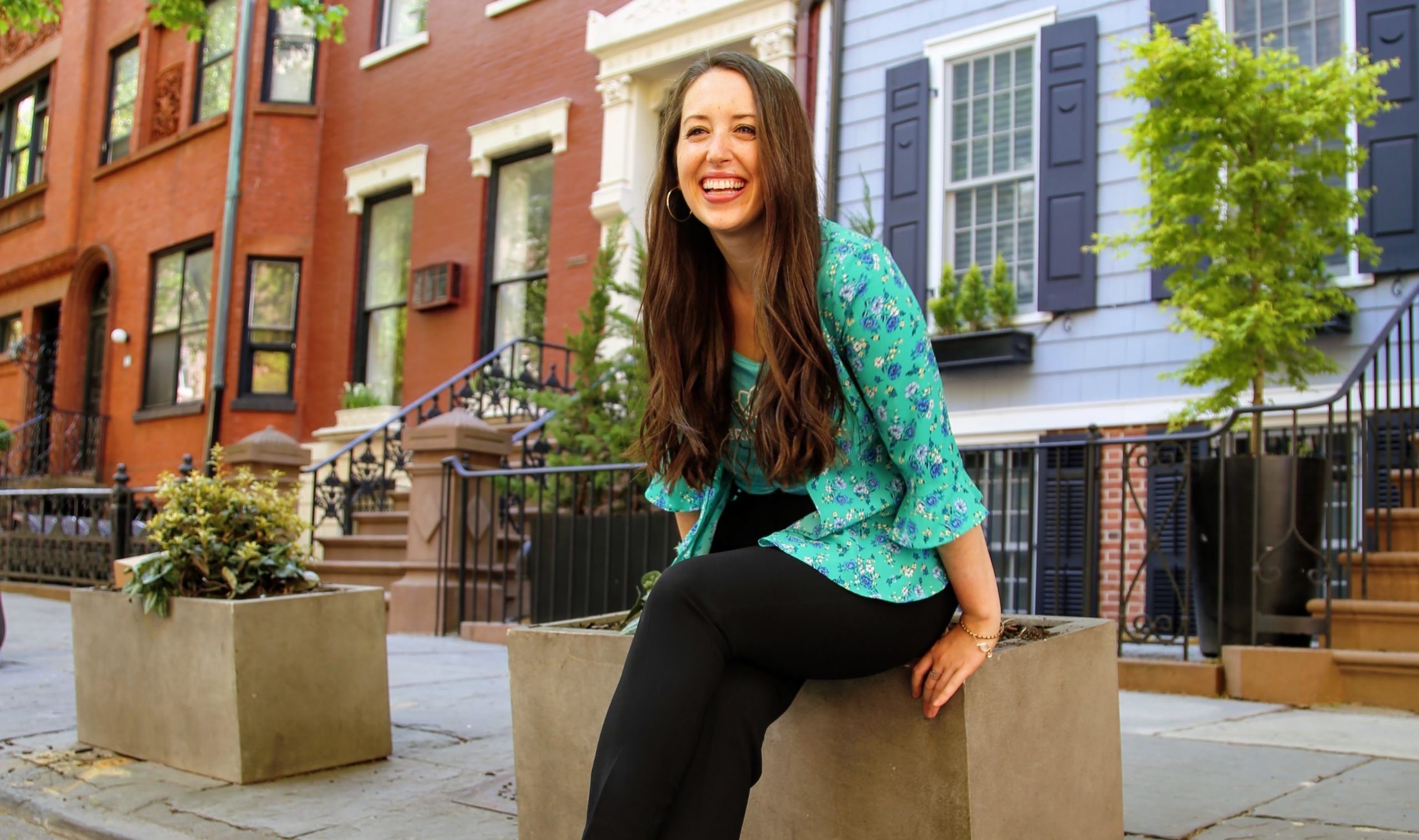
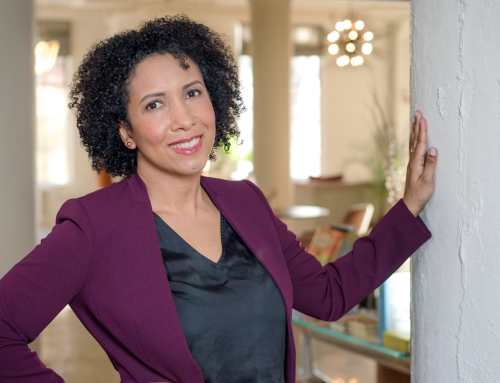
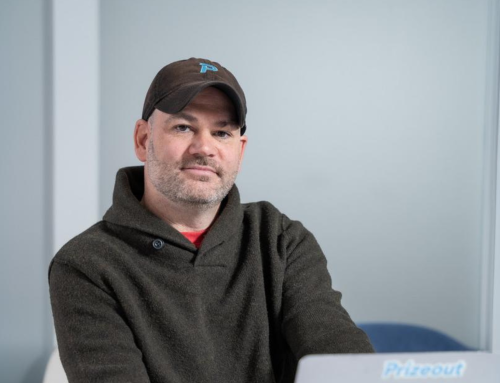
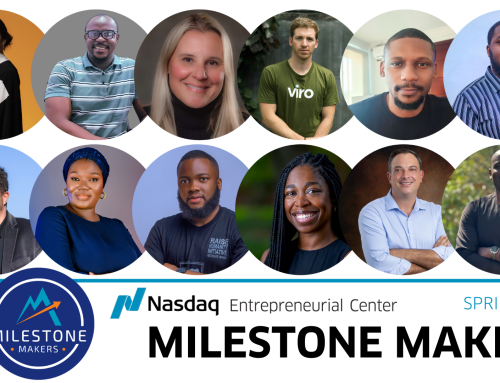
Invite a Friend
Close